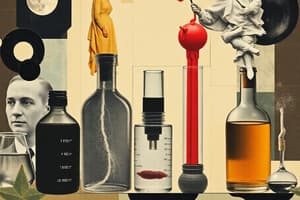Podcast
Questions and Answers
What role does the independent variable play in an experiment?
What role does the independent variable play in an experiment?
The independent variable is the one that scientists change during an experiment.
Explain why control variables are essential in an experiment.
Explain why control variables are essential in an experiment.
Control variables are essential because they ensure that only the independent variable affects the dependent variable.
What is the primary purpose of a hypothesis?
What is the primary purpose of a hypothesis?
The primary purpose of a hypothesis is to make a prediction about what will happen in an experiment, supported by an explanation.
Describe the difference between continuous and discrete data.
Describe the difference between continuous and discrete data.
What elements should be included in a risk assessment?
What elements should be included in a risk assessment?
What are the key features of a well-structured table of results?
What are the key features of a well-structured table of results?
When should a line graph be used instead of a bar chart?
When should a line graph be used instead of a bar chart?
What constitutes a good graph in terms of presentation?
What constitutes a good graph in terms of presentation?
Why do scientists utilize graphs in data analysis?
Why do scientists utilize graphs in data analysis?
In a measurement context, what is meant by the term 'observation'?
In a measurement context, what is meant by the term 'observation'?
Flashcards
What is a hypothesis?
What is a hypothesis?
A prediction about what will happen in an experiment, supported by an explanation.
What is a variable?
What is a variable?
Something that can change or be changed during an experiment.
What is an independent variable?
What is an independent variable?
The variable that the scientist changes during an experiment.
What is a dependent variable?
What is a dependent variable?
Signup and view all the flashcards
What are control variables?
What are control variables?
Signup and view all the flashcards
What is a table of results?
What is a table of results?
Signup and view all the flashcards
What is continuous data?
What is continuous data?
Signup and view all the flashcards
What is discrete data?
What is discrete data?
Signup and view all the flashcards
Why do scientists draw graphs?
Why do scientists draw graphs?
Signup and view all the flashcards
What is a line of best fit?
What is a line of best fit?
Signup and view all the flashcards
Study Notes
Variables in Experiments
- A variable is something that can change in an experiment
- The three types of variables are dependent, independent, and control
- The independent variable is the one that scientists change
- The dependent variable is the one that scientists measure
- Control variables are kept the same to isolate the effect of the independent variable
Experiment Design
- Scientists only change one thing at a time to see its effect on the dependent variable
- Control variables are important for accurate results
Hypothesis
- A hypothesis is a prediction about what will happen in an experiment
- It is an explanation, often supported by previous knowledge
Risk Assessment
- A risk assessment needs a hazard, risk, and safety precaution
- A hazard is something that has the potential to cause harm or damage
- A risk is how that hazard could cause harm or damage
- A safety precaution is what to do to avoid the risk
Measurements and Observations
- A measurement is the result of an experiment that can be quantified using scientific equipment
- Examples include mass, distance, time, force, wavelength, and temperature
- An observation is something that can be seen in an experiment, like colour changes, light emission, or movement
- Examples include colour, giving off light, gas production, etc
Types of Data
- Continuous data has numerical values that can be any size (e.g., mass)
- Discrete data has numerical values that can be put into categories (e.g., eye colour)
Tables and Graphs
- Results tables organize experimental data with independent and dependent variables
- Independent variable on the left, Dependent variable on the right
- Graphs visually depict relationships between variables
- Bar charts suitable for discrete data; line graphs for continuous data
- Graphs should have clear titles and labels, appropriate scales, and lines of best fit where needed
Graphing Considerations
- Independent variable on the x-axis; dependent on the y-axis
- Scales should be easy to understand and evenly spaced (e.g., use 1, 2, 5, 10 etc.)
Studying That Suits You
Use AI to generate personalized quizzes and flashcards to suit your learning preferences.




